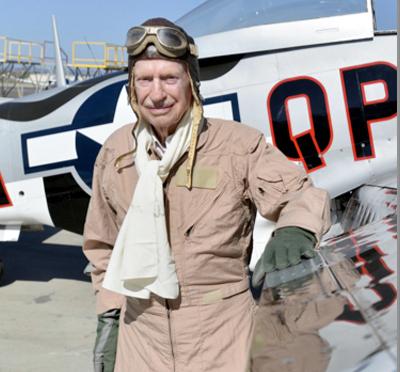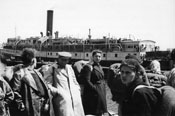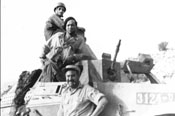Aliyah Bet & Machal Virtual Museum
North American Volunteers In Israel's War of Independence
Mitchell Flint, Machal Pilot, Dies at 94

Mitchell Flint was a Jewish-American Navy pilot in the Pacific Theater who answered the call to help build air support for the nascent State of Israel. He bravely flew Avia-199 fighters, which, as retrofitted German Messerschmitts, were extremely dangerous because of their poor construction. After he arrived in Israel, he flew more than 50 missions. When the Egyptian army gathered in the Falujah pocket, Flint and his squadron proved how vulnerable they were from his bombing missions. The Egyptians ended their offensive and return home, hastening the conclusion of Israel's War of Independence.
Below is Flint's obituary by Steve Marble in the Los Angeles Times, Sept. 26, 2017:
He flew bombing missions for the U.S. during World War II and then came back to America to study law.
But the escalating conflict between the newly declared state of Israel and its Arab neighbors had already gotten under Mitchell Flint's skin.
"I'm Jewish, Israel desperately needed fighter pilots, so I thought I could perhaps do something to sustain the state," he said years later in an interview with the Times of Israel.
To get around a law that prohibited American citizens from fighting for a foreign nation — and to appease a mother who felt fortunate her son had already survived one war — Flint came up with a ploy.
He told his mother, and government passport officials as well, that he was going to attend the 1948 Olympic Games in London and then explore Europe as a tourist, not a soldier. It would be a graduation gift to himself, he told them. To keep his ruse going, he sent postcards and letters to friends and relatives in England to occasionally mail off to his mother to keep her from worrying.
And then Flint went back to war, becoming one of the emerging nation's elite airmen and part of a pioneering group of pilots who created what became the Israeli Air Force.
When Israel celebrated its first independence day anniversary in 1949, Flint was among a dozen pilots who flew above the ceremonial parade in fighter jets, a thunderous symbol of endurance and resolve.
A lifelong pilot and adventurer, Flint died Sept. 16 at his Los Angeles home of natural causes, his son Michael said. He was 94.
Born in Kansas City, Mo., on June 27, 1923, Flint enlisted in the U.S. Navy when he turned 18. It was the depth of World War II, and Flint desperately wanted to be a fighter pilot like his father, who had flown during World War I.
His assigned weapon was the F6F Hellcat, a fighter plane the Navy felt had the stuff to overtake the speedy A6M Zeros used by the Imperial Japanese Navy. Flying in the Pacific, Flint was awarded three Air Medals and eight Navy Unit Commendations for the dogfights and bombing mission he led.
After the war, Flint graduated from UC Berkeley. Though he'd long planned to attend the Olympic Games in London, which had been canceled four years earlier in 1944, he knew there was another battle waiting — to buck up the fledgling state of Israel, outnumbered and boxed in by its Arab neighbors.
To keep his mother from becoming suspicious, he flew to London. But rather than head to the sporting venues, he met up with a contact and was whisked to Czechoslovakia, a staging ground for aspiring Israeli fighter pilots.
Flint and the other pilots trained in Avia S-199s, a workmanlike plane that was assembled from the parts, flaps and wings left behind by the Germans. Nazi swastikas were erased and replaced with the Star of David. The fighter planes, though, had their issues. They were identical to the Messerschmitts flown by the Germany, but the propellers — through which the bullets were fired — were supplied by the Czechs.
Because of a timing issue, Flint's son said, the bullets would periodically — if not frequently — blow the blades off the propellers, leading to harrowing falls from sky, emergency landings and crashes. Once the problem was corrected, the 199s would form the backbone of Israel's air attack and become the battering ram of an aerial unit known as the 101 Squadron.
For months, Flint flew on espionage and scouting missions, eventually being named executive officer of a dive-bombing team. In all, he flew over 50 missions, including some of the fledgling state's most pivotal battles. He served alongside Ezer Weizman, Israel's future president, and is credited with leading the mission that turned back the advancing forces of Col. Gamal Abdel Nasser, Egypt's future president.
"That was absolutely the pivotal battle that saved Israel," his son said.
When he returned to the U.S., Flint earned his law degree from UCLA, set up private practice in Hollywood and married his wife, Joyce. Together they had two sons, Michael and Guy.
In 2012, he made right on his long-ago fib about attending the Olympics. The games were back in London and, rather than the austere gathering of 1948 — when visiting nations were asked to bring their own food — it was a multibillion-dollar spectacle. Flint and his son were there.
Flint's exploits as a founding member of Machal, the group of non-Israelis who went to war for the embattled nation, are chronicled in the soon-to-be released book "Angels in the Sky: How a Band of Volunteer Airmen Saved the New State of Israel." His son Michael is working on a film version of the story.
Michael Flint said his father ultimately confided his deception to his mother, telling her that if something had happened to him in battle, it seemed kinder to leave her with the lasting thought that he'd spent his final days enjoying peacetime in Europe.
"He told me later that he didn't expect to come back."
Flint is survived by his wife and two sons.
steve.marble@latimes.com
twitter.com/stephenmarble
- Log in to post comments

 Back to News
Back to News


 Contact Us
Contact Us
 In a personal essay, Aliyah Bet and Machal Archives Director Ralph Lowenstein discusses the reasons why so few persons have ever heard of the thousand or so volunteers from North America who played a role in the winning of the War of Independence.
In a personal essay, Aliyah Bet and Machal Archives Director Ralph Lowenstein discusses the reasons why so few persons have ever heard of the thousand or so volunteers from North America who played a role in the winning of the War of Independence.